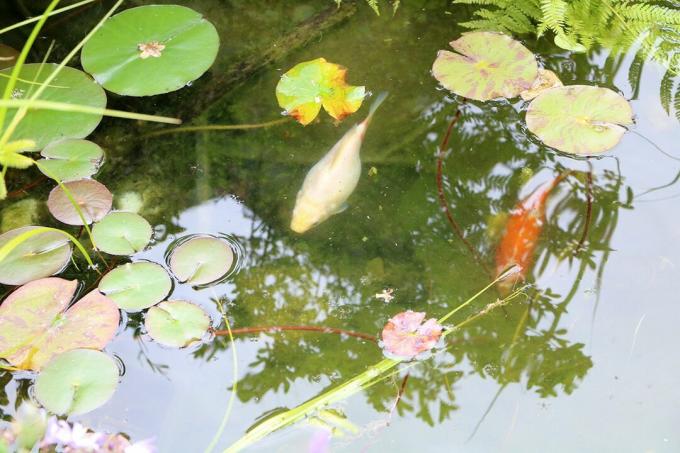

Table of contents
- More detailed description of the blue orfen
- Advice on keeping ornamental fish
The blue orfe, also called aland, belong to the family of carp fish. They are particularly easy to recognize by their blue color. Sometimes only the back stands out with an intense blue coloration. Blue orfe are now very popular in garden ponds, especially since they are relatively easy to keep.
More detailed description of the blue orfen
The stretched, streamlined body shape already suggests that the blue orfes are agile, nimble swimmers. In community with other fish, they will therefore always be the first to arrive at the food being served. Blue orfen can reach a length of up to 60 cm. The animals lay their eggs between April and July. They can live up to 20 years.
Advice on keeping ornamental fish
Even if the blue orfe is a fairly undemanding fish species, a few tips on keeping it can still be useful.
- The blue orfe are schooling fish, which is why they should always be purchased from a minimum quantity of 5 specimens.
- A pond that is to be stocked with blue orfen must contain at least 4000 liters of water at a depth of one meter and more. Smaller ponds are unsuitable for this type of fish.
- Blue orfe require a very oxygen-rich and also clean water.
- Since the blue orfes enthusiastically hunt mosquitoes that are on the water surface, the fish help to reduce the annoying pests.
- Due to the preferred hunting of insects, the blue orfe usually swim directly under the water surface. Therefore, they are always easy to recognize and observe in the water.
- Belonging to the carp family, blue orfe are predatory fish that feed on snails, worms and smaller fish in addition to mosquitoes. Since they also do not reproduce excessively themselves, there will be no overpopulation in a pond stocked with blue orf.
- Only when there is a lack of food do the blue orfes go to the bottom of the pond to dig for water.
- Blue orfe are ideally fed with sticks containing protein or commercial fish food.
If you like to relax by your pond and watch the fish in it, you've come to the right place with blue orfe, especially as it is a species of fish that is beautiful to look at. If food is sprinkled on the water, the fish come swimming in droves at high speed.
 garden editorial
garden editorial I write about everything that interests me in my garden.
Find out more about animals in the garden pond

22 small pond fish | Fish for small pond
Only a small pond fits in small gardens. But Mother Nature has also created a few little fish for these mini ponds. To be more precise, even several interesting species, which are not inferior in beauty to the large specimens. But be amazed!

7 Fish Diseases | Help for pond fish
For many an animal lover, their fish mean everything. The concern is correspondingly great when the animals suddenly behave in a strange way or show external symptoms of one of the numerous pond fish diseases. This guide explains how the owner makes an exact diagnosis, what causes it and what to do in this case.

Overwintering pond mussels | 14 tips for pond mussels in winter
Pond mussels are practical animals for the garden pond, as they can filter and thus clean the water. Their main food source is algae. But what happens to the pond mussel in winter when the water surface freezes over? Here we reveal how overwintering is possible.

Orfe in the garden pond | 10 tips for keeping & propagation
The water has been filled in, the green planting is in place. Now a color contrast and movement in the garden pond are still missing. A swarm of gold orfs can provide both. Yellow-orange in colour, they are clearly circling in the water. When do you feel comfortable in it?

Frog in the pond: what do frogs eat in the garden pond?
Frogs in the pond are important beneficial insects because they devour numerous annoying pests. Frogs are good and patient hunters, able to ambush prey for a long time. The more diverse the pond is designed, the greater the food supply, which attracts different species.

Sturgeon in the garden pond | 10 tips for keeping in the pond
Would you like to enrich your pond with a real sturgeon? The desire for such a striking animal is easy to understand. Our tips on how to handle this living fossil will help you ensure that keeping is always successful.

